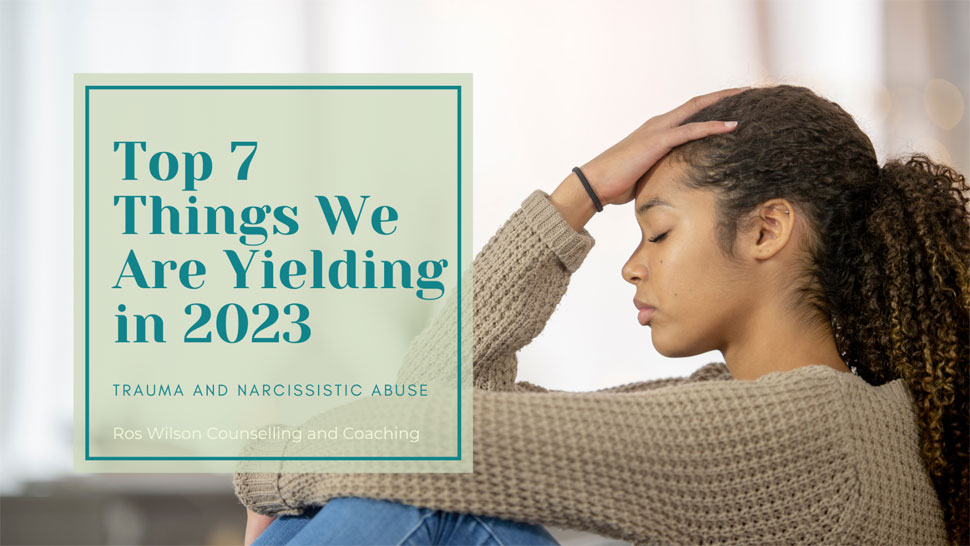
Introduction
When it comes to resilience and forgiveness, I know that I am being hard on myself. As someone who has been a
trauma and narcissistic abuser victim, I can totally relate to the things I
am covering in this blog post.
After all, I am still working on my own healing journey. But not everyone is on their own journey to healing and growth; survivors need support too.
And that's why in this article, I'm focusing on how we can make sure we are giving up these 7 things in our lives that don't serve us. These are all things we are told to do, but when
you're in an abusive relationship, it's almost impossible to think clearly, let alone implement change.
Remember that trauma and narcissistic abuse is a very triggering experience however, once we get over this hurdle, we can start recovering and begin to see things not just through the
lens of a victim but rather through that of an empowered survivor with a purpose.
Not Setting Boundaries
Trauma and narcissistic abuse can have
devastating effects on victims. However, recovery is possible if we make the right decisions.
One of the most important steps in recovery is setting boundaries, which can help us protect ourselves and others from further harm. By 2023, let's make a personal commitment
to setting healthy boundaries that will help us on our journey of healing. Giving up on boundaries is no longer an option, so let's prioritize creating ones that are right for us.
When you cut ties with a narcissistic parent for instance, a part of you may want to ignore them and avoid contact altogether. Vowing not to answer their calls or texts, as well
as avoiding them altogether may be the best way to keep your sanity and peace of mind.
If someone thinks they can persuade you over time, they might not take 'no' for an answer. They may contact you frequently to see if you'll change your mind, disregarding the
boundaries you've set in the process.
Narcissistic abuse can severely damage the sense of trust and security when forming relationships with other people. It can also be difficult to establish healthy boundaries in these
relationships if you've been exposed to such abuse.
Clinging to Trauma Bonds
People who went through a tough childhood or had been exposed to abusive relationships in adulthood may develop Trauma Bonding - a powerful emotional bond with their abusers.
Frequent abuse from loved ones can lead to us forming a distorted view of love and relationships. The earlier this happens in life, the more difficult it is to break out of this unhealthy
pattern.
Our idea of being loved is often tainted by abuse. We struggle to recognize the true sense of being cherished, cared for and nurtured that real love should provide.
The ultimate weapon in stopping trauma bonds is to be a best friend to yourself.
Would you ever want your closest friend to have a negative experience?
Is it really worth the suffering of being neglected, mistreated, or hurt again and again?
You are worthy of love and respect. You don't need to accept any form of mistreatment; you deserve the best in life and that includes being appreciated for who you are.
You are already such an amazing individual and you deserve to appreciate yourself for who you are. You should also look for people who can truly recognize your value and be with them.
Most importantly, you need to start seeing your worth too.
Self-blaming and self-pitying
It's important to differentiate between healthy accountability and toxic self-blame or self-pity. The former is something beneficial that allows us to grow and learn, while the latter
is damaging and can impede our progress. How we think of ourselves in the aftermath makes a world of difference.
Stop beating yourself up!
To effectively move on from a narcissistic relationship, it's important to have confidence in yourself & take necessary steps to assert yourself. Believe in your strength & resilience
and you'll be able to break the trauma bond.
This article can definitely help you in managing your relationship with a narcissist but it is often useful to consult a Trauma Informed coach as well. They can offer valuable advice
tailored to your individual circumstances.
With a Trauma Informed coach, you can get advice tailored to the specific issues you’re facing in your love life and in your family relationships then ultimately make sure you don’t
fall into a vicious cycle of another trauma bond in the future.
Putting a blind eye to a narcissist's behaviour
To free yourself from the psychological shackles of a narcissistic relationship, self-reflection is essential. Looking candidly at their actions can help you understand why it's so
important to take the necessary steps to break free from the trauma bond.
Take a break from the excuses and embrace the present moment.
Your girlfriend may have come from a difficult past, which can make her crave for attention and expect to get what she wants. This could be as an outcome of not being treated fairly by
her mother or having a tough upbringing.
Your father's childhood experiences with disability and divorce might be the cause of his current short temper & expectation of obedience from others. He may have developed these habits
as a result of these events.
Your partner's string of career setbacks has been tough for him, and it's understandable if he's currently in a state of depression. However, this is not something that can be solved
by one person alone and your boyfriend should take responsibility to improve the situation.
Setting aside those reasons and details for now.
Observe the behavior of others objectively and then compare it to your own.
Are you dealing with someone who doesn't show any gratitude towards your efforts and instead carries out their anger on you?
Do you feel like you have failed someone who consistently fails to make a sincere effort, yet still expect something from you? The guilt that may come along with this situation is
understandable; however, it is also important to remember that your needs should come first.
We must face the reality that this type of conduct is unacceptable, regardless of whatever its roots may be. It's time to take decisive action against such behaviour.
Letting your fear rule over you
Overcoming a traumatic bond with a narcissist takes courage and determination. You must be willing to push past the fear and recognize the unhealthy relationship dynamics in order to
move forward.
Narcissists may seem to offer you love, rewards, validation, and a better future, but they often resort to fear as their main tool of manipulation.
If you decline their request, they may become angry or ignore you for a long period of time.
Refusing to be used by someone can often lead to an emotional backlash. This may come in the form of anger, outbursts, and even weeks of silent treatment. Manipulators often rely on
people's fear of confrontation or feelings of guilt so they can get what they want. It's important to recognize these tactics and stand up for yourself in order to protect your own well-being.
Refusal to be manipulated can elicit negative reactions from them, ranging from open hostility to weeks of cold shoulders.
Leaving them may be met with threats of self-harm or suicide, so it is important to proceed with caution.
They'll go to great lengths to ensure they have control over you and make sure your trauma bond with them remains as strong as ever. This gives them a sense of power and keeps them
dependent on them.
It’s okay to feel the fear but get out of your shell and do the right thing anyway.
Your fear may make you ‘frozen’ but proceed forward anyway. Leave this toxic relationship behind.
Playing the role of your narcissist's Savior (Co-dependency relationships)
Codependence is often a common occurrence in relationships, with one person taking on the “victim” role and the other taking on the “savior” role.
The narcissist in this case would be the victim of his own self-love. Even though you are the actual victim, the narcissist would play the role of never getting enough credit.
You will try to fix things for her or him. Unfortunately, you can never do enough.
Codependency is a lost battle. Don’t play its game and if you are caught in its trap, make every effort to walk away.
Not seeking out support
With every bit of these steps, they can be hard to do.
There will surely be broken relationships.
Letting go can mean you have to file for a divorce.
Letting go could mean you will need to end the friendship.
Letting go could mean cutting off family ties.
That’s why it’s key to finding the right support.
The right support can make you get busy with other things you love to do and re-establish strong ties with other people you love.
Just reach out and start your healing journey.
Find your safe space where you can:
- Learn coping strategies to manage the effects of trauma and mental health symptoms
- Learn to set healthy boundaries
- Discover ways to rebuild your sense of self
Conclusion
As a certified trauma-informed coach and a narcissistic abuse recovery specialist who myself have undergone this journey, I know what you're experiencing — and I'm telling you to not
give up, and not settle for your current situation. Healing is possible and let's start that journey today.
Please contact Ros for more information
Ros Wilson Counselling, 77 Anne Road, Knoxfield, Vic 3180. 0422 120 114



